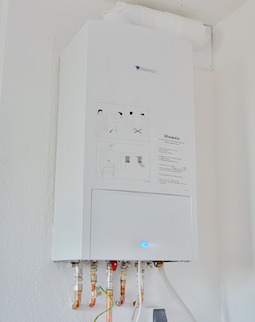Advantages of Tankless Water Heaters
Tankless water heaters have become a popular alternative to the bulky conventional tank heaters that serve many homes and businesses, and with good reason. Tankless water heaters take up less space, save power, eliminate the issue of running out of hot water, and last up to four times longer than heaters with tanks.
If your water heater has reached the end of its life and needs to be replaced, or if you simply want to update your water heating system, discuss your current situation with a trusted plumber who will share the benefits and drawbacks of various water heater types to help you make an educated decision on a heater that will suit your home and lifestyle.
Top 4 Benefits Tankless Hot Water Heaters
Installing a tankless water heater comes with considerable advantages simply as a result of how the heater operates.
- Endless Supply of Hot Water: Traditional tank water heaters warm water one tank at a time, and when that reservoir empties, only cold water is available until the next tank-full heats up (commonly a problem when you run out of hot water mid-shower). However, in a tankless heater, burners rapidly heat water as it moves through a pipe in the unit, allowing an endless supply of hot water to flow as needed to your kitchen faucets, shower, and washing machine.
- Energy and Heating Bill Savings: In addition to eliminating cold showers, a tankless water heater also saves energy and lowers heating bills; the heating elements only operate when there is a demand for hot water, rather than constantly burning to keep a full tank of water hot.
- Space Savers: Tankless water heaters also free up space in the house that would otherwise be occupied by a large holding tank of water.
- Longer Life Span: A primary benefit of a tankless unit is lifespan. On average, a tankless water heater is warrantied for 15 years, a stark contrast to the six-year warranty on most tank heaters.
Disadvantages of Tankless Water Heaters
While the perks of a tankless heater are undeniable, a few drawbacks are worth considering before deciding on a new unit. The greatest disadvantage is that while a tankless water heater can save hundreds in heating bills over the years, the initial cost to purchase and install the unit is about three times as much as buying a tank heater. An extension of the high start-up cost is that electric tankless water heaters may require upgrading your home’s electrical system to accommodate the unit’s power usage.
Another possible drawback is that a tankless heater is not as capable of supplying multiple points at once—so if you plan to shower and run the dishwasher at the same time, the water that the unit heats will be split to service both fixtures. In most single family homes, this is rarely a problem. For larger businesses such as hotels, restaurants, and apartment complexes, this issue can be addressed by installing a system of tankless heaters.
Gas vs. Electric Tankless Heaters
Tankless water heaters can be powered either by natural gas/propane or by electricity. Deciding on which type is ideal for a certain home depends on several factors.
Electric tankless water heaters are usually less expensive than gas models. However, electric units require up to 120 amps of electricity at a time, and since most homes only have a 200-amp maximum capacity, installing the water heater may require an extensive update to the house’s electrical system. This factor alone may be a good reason to opt for a gas unit. In addition, gas units can provide a higher flow rate of hot water.
A few things should be kept in mind with gas tankless heaters: the units must be serviced annually; operating costs fluctuate with the cost of propane/natural gas; and gas units produce greenhouse gases.
Whether you are debating whether you want a tankless or a tank water heater, or if you have already decided on a tankless and need advice on what model to purchase, the technicians at Morton Plumbing are happy to provide a consultation, and professionally handle from beginning to end the process to install the heater in your home.
Morton Plumbing, Heating & Cooling believes in educating our customers on all the hot water choices for your home or business. You deserve an honest choice when it comes to plumbing. Our plumbers do not work off commission. Simply put, “We never upsell.” We are interested in building a relationship and being your plumbers for life.
Still have questions? Our plumbers are here to help. Call our Nashville office at (615) 255-2527.
Our plumbing company serves Nashville TN and surrounding areas.
Morton Plumbing, Heating & Cooling2426 Winford Ave.
Nashville, TN 37211
Did you know?
Our plumbers can help you with the following problems:

Tankless Heaters
Schedule your tankless water heater consultation by calling Morton Plumbing, Heating & Cooling at (615) 255-2527 or by using our online service request form.
Facebook Review
I just want to let everyone know what a great company Morton Plumbing is! You were the only company to NOT say, “Well, in order to fix the leak, you will have to replace all of your bathroom pipes!” (even though they aren’t even 7 years old) Thanks for the great service, and for the great cust ...
Serving Nashville, TN
Morton Plumbing, Heating & Cooling, Inc. services Nashville, TN and surrounding areas.
